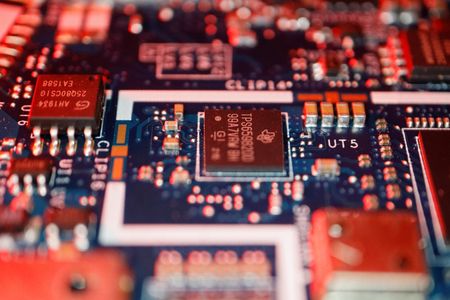 1
1 1
1
By Toby Sterling
AMSTERDAM (Reuters) -The Dutch government on Friday announced new restrictions on exports of some semiconductor equipment, boosting a U.S.-led drive to curb supplies of high-tech components to China but drawing an angry response from Beijing.
“We have taken this step in the interest of our national security” said Dutch Trade Minister Liesje Schreinemacher, adding such equipment may have military applications.
Schreinemacher said a “very limited” number of companies and product models would be affected, and China was not named. But the Chinese Embassy in the Netherlands described the move as an “abuse of export control measures” that violate trade rules.
ASML, a Dutch company that is a key equipment supplier to computer chip makers, said it did not expect the new rules to have a material impact on its business and it was not changing its financial guidance.
The rules, which will require companies that make advanced chipmaking equipment to seek a licence before they can export it, are expected to go into effect on Sept. 1.
A technical document specifying which equipment will require a licence accompanied the announcement.
The list is the result of a high-level agreement between the U.S. and two allies with strong chip equipment industries – The Netherlands and Japan – to tighten restrictions as Washington seeks to hobble Beijing’s ability to make its own chips.
ASML, Europe’s largest technology company, repeated a March statement indicating the top section of models of its second most advanced “DUV” lithography systems, which are used to help print the circuitry of chips, would need a licence.
It named its 2000 series “and subsequent” models. ASML’s most advanced “EUV” machines have never been shipped to China.
ASML’s shares were down 1.7% at 657.40 euros at 1140 GMT, while smaller rival ASM International dipped 0.8% to 381.10.
ASM International, which makes atomic layer deposition tools, said it did not expect a material change to its forecasts as a result of the Dutch rules, which also discuss that technology.
The U.S. in October imposed export restrictions on shipments of American chipmaking tools to China from U.S. companies like Lam Research and Applied Materials on national security grounds, and lobbied other countries with key suppliers to do similar.
China decried the move, part of a heightening of tensions between the two countries that has spanned everything from 5G equipment and alleged spy balloons to relations over Taiwan.
Reuters reported on Thursday the U.S. may introduce additional rules next month, which could affect other, slightly older models of ASML machines. The U.S. can regulate ASML directly as its products include U.S. technology.
In Friday’s statement, China called on the Netherlands to “immediately correct its wrongdoings” and said the restrictions imposed in the name of national security were in fact trade restrictions that would harm both Dutch and Chinese companies.
Schreinemacher said she expected about 20 licence applications per year, representing a “limited part of the total product portfolio of the companies that fall under this rule”.
ASML has been restricted from selling EUV machines without a licence under an international agreement known as the Wassenaar Arrangement.
European Union countries share a common trade policy and generally use the Wassenaar Arrangement to determine which exports are restricted on security grounds.
The new Dutch list may later be adopted by other European countries or added to the EU list, though few European firms export high-end chipmaking equipment.
German manufacturers supply essential parts to ASML, including lasers made by Trumpf and lenses made by Zeiss, among others.
(Reporting by Toby Sterling Editing by Louise Heavens and Mark Potter)